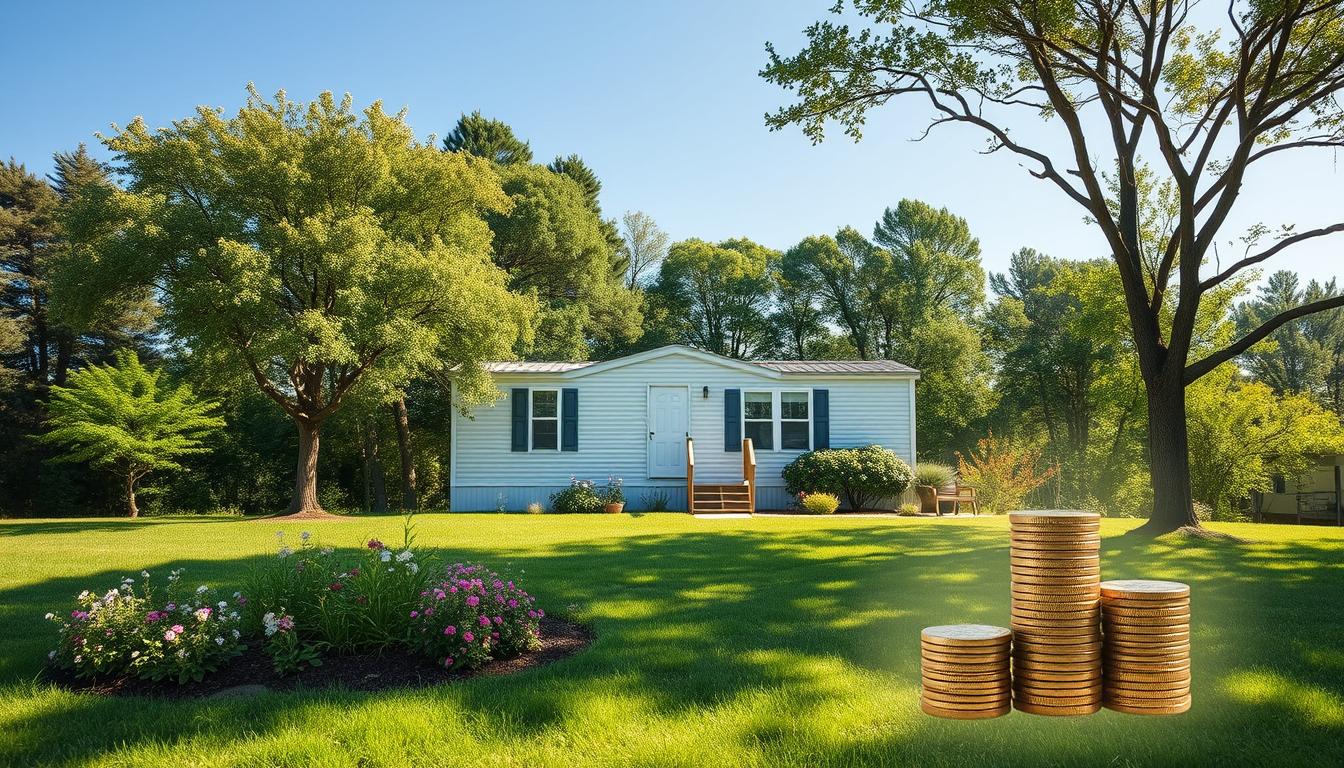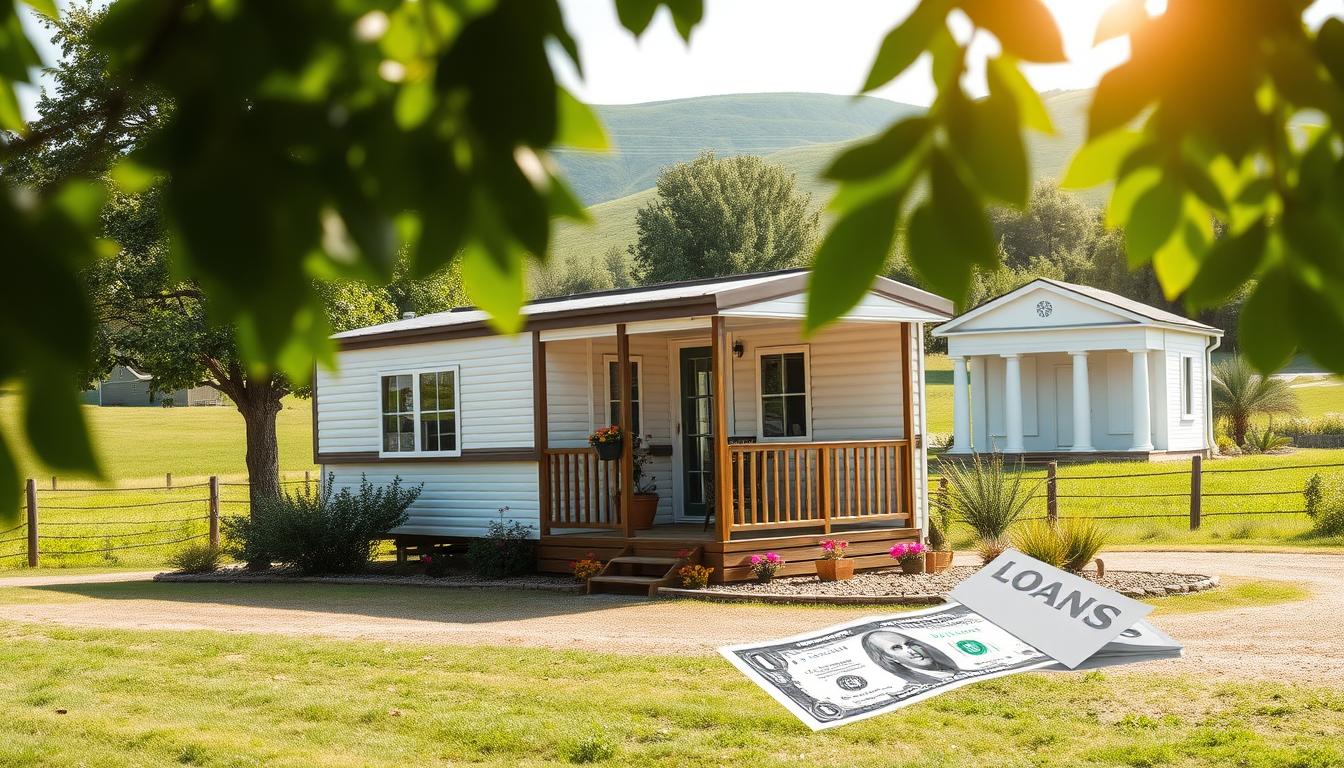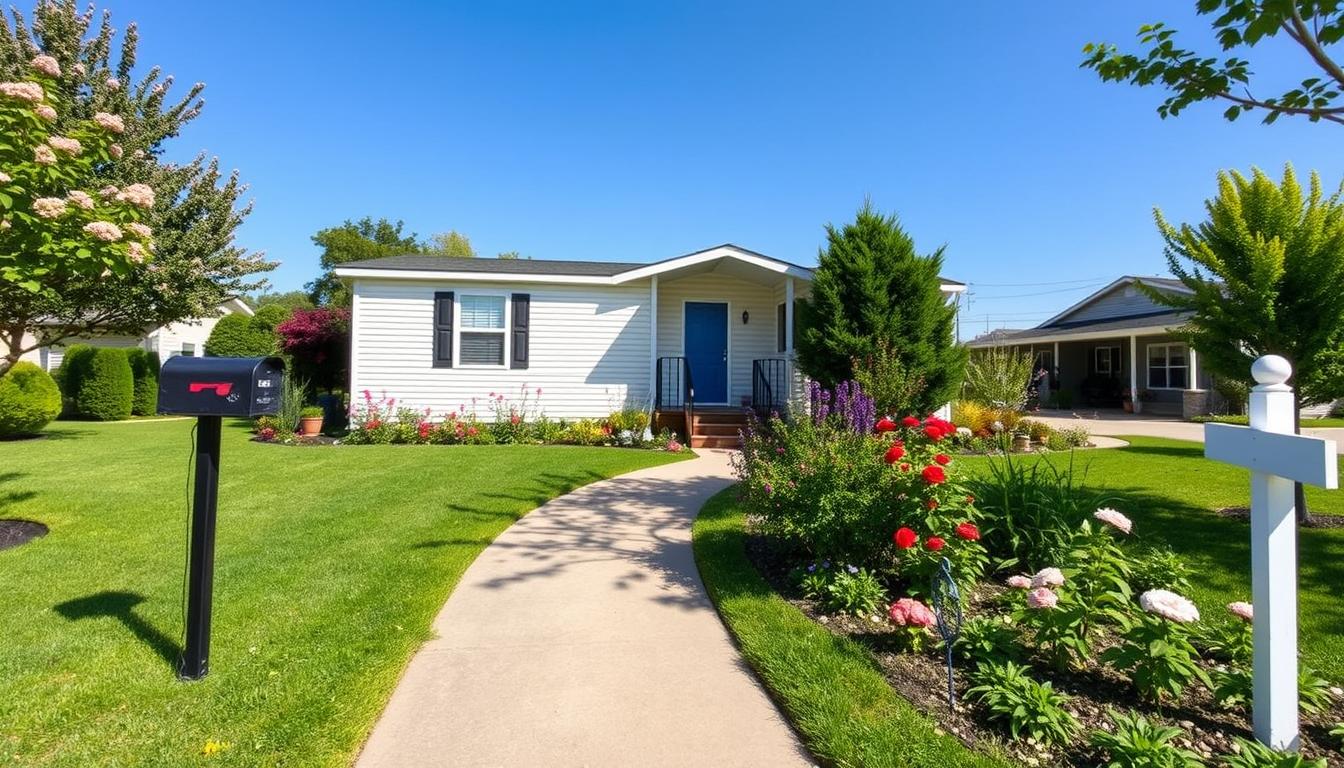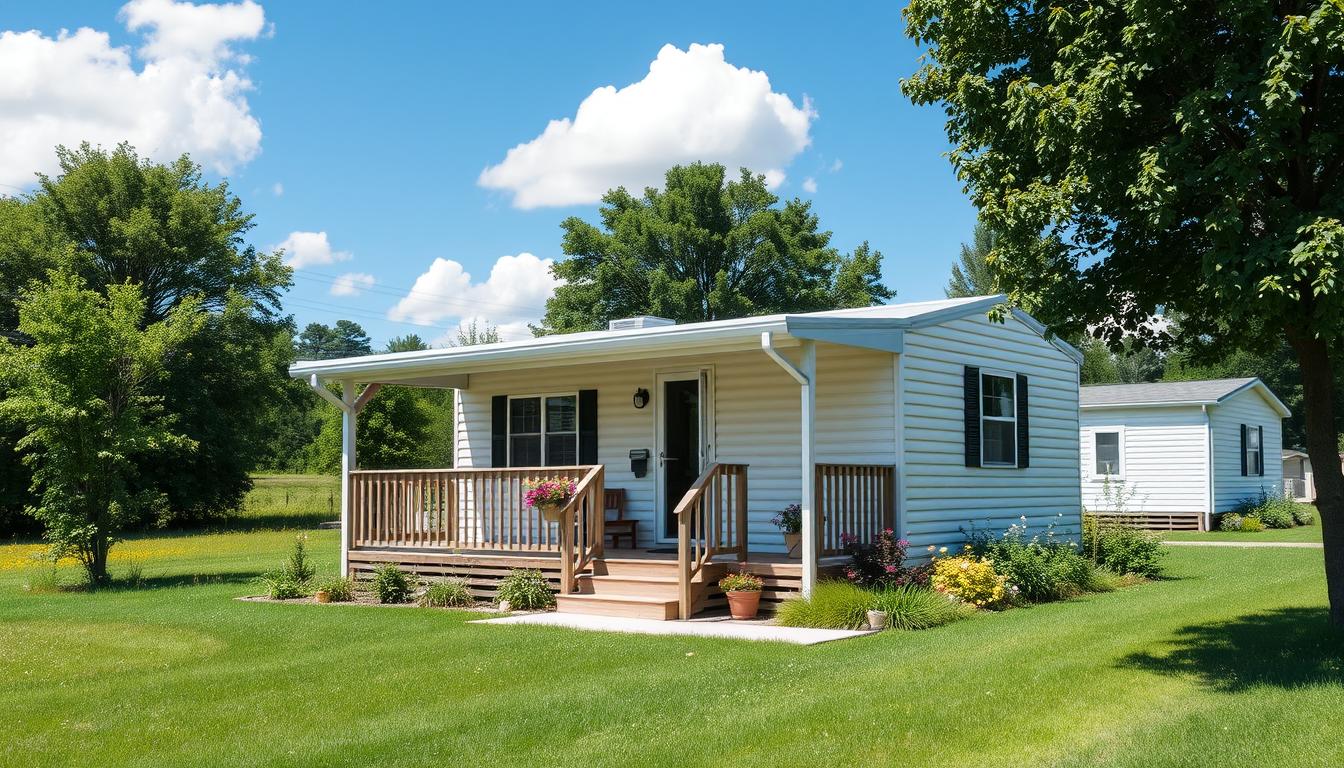Home Equity Loans on Mobile Homes: Top Lenders Guide
Thinking about using your home’s equity can be both thrilling and scary. But, what if you own a mobile or manufactured home? The bright side is that there are lenders who focus on these types of homes. They offer good rates and flexible terms. In this detailed guide, we’ll look at the best lenders and share important tips for your financial future.
Key Takeaways
- Manufactured Nationwide offers up to 80% of a mobile home’s value in equity financing, plus an additional $50,000 available before or at closing.
- Manufactured Nationwide has been rated the #1 Manufactured Home Lender by Investopedia for five consecutive years.
- The minimum credit score required for FHA cash-out refinance loans from Manufactured Nationwide is 640.
- Manufactured Nationwide provides the unique Mortgage Client Consumer Loan™ offering up to $50,000 extra for qualified borrowers.
- Manufactured Nationwide emphasizes no prepayment penalties and manageable mortgage insurance premiums on their FHA cash-out loans.
Understanding Mobile Home Equity Loans Basics
Mobile home equity loans work like regular home equity loans but with special rules for mobile homes. You can borrow up to 80% of your home’s value. This is a great way to use the equity in your mobile or manufactured home.
How Mobile Home Equity Loans Work
These loans let you borrow against your home’s value, using it as security. The loan amount depends on your home’s appraised value and any mortgage you still owe. This way, you get good interest rates and flexible terms to fit your budget.
Benefits of Mobile Home Equity Financing
- Competitive interest rates compared to unsecured loans
- Flexible loan terms, often ranging from 5 to 30 years
- Ability to use funds for various purposes, such as home improvements, debt consolidation, or large purchases
Requirements for Qualification
To get a mobile home equity loan, you need to meet certain requirements:
- Minimum credit score of 640
- At least 20% equity in the home
- Debt-to-income ratio of 43% or lower
- The mobile home must be permanently affixed to a foundation and meet HUD’s Manufactured Home Construction and Safety Standards
Learning about mobile home equity loans can help homeowners use their home’s value. It’s a way to meet financial needs and improve your home.
Who Does Home Equity Loans on Mobile Homes
Several lenders offer home equity loans for mobile homes. Manufactured Nationwide provides FHA cash-out refinances in all 50 states. 21st Mortgage Corporation finances new and used mobile homes in most states.
Guild Mortgage offers various loan options for manufactured homes with low down payments. Other lenders include eLEND, ManufacturedHome.Loan, and Vanderbilt Mortgage and Finance.
Mobile home owners need lenders who understand these properties. They should be willing to help unlock the equity in their homes.
| Lender | Specialty | Loan Options |
|---|---|---|
| Manufactured Nationwide | FHA Cash-Out Refinances | Manufactured Homes in All 50 States |
| 21st Mortgage Corporation | Financing for New and Used Mobile Homes | Most U.S. States |
| Guild Mortgage | Manufactured Home Loans | Low Down Payment Options |
| eLEND | Mobile Home Equity Financing | Competitive Rates and Terms |
| ManufacturedHome.Loan | Specialized Mobile Home Lender | Flexible Loan Programs |
| Vanderbilt Mortgage and Finance | Mobile Home Financing | Nationwide Coverage |
By choosing the right lenders, homeowners can access the equity in their properties. This can be for home improvements or debt consolidation.
Top Mobile Home Equity Loan Lenders Overview
Several lenders are top choices for home equity loans on mobile or manufactured homes. They offer flexible financing and help borrowers with different credit scores. These lenders provide solutions for those looking to use their mobile home’s equity.
21st Mortgage Corporation Options
21st Mortgage Corporation is a well-known provider of mobile home financing. They offer loans for both new and used homes. With no minimum credit score and down payments from 5% to 35%, getting a home equity loan is easy.
Manufactured Nationwide Solutions
Manufactured Nationwide is a leading lender in mobile home equity loans. They have been ranked #1 Manufactured Home Lender for 5 years by Investopedia. They provide various financing options, including FHA, VA, and USDA loans, with amounts up to $3 million.
They offer One-Time Close and Two-Time Close Construction Loans for different mobile and modular homes. Borrowers can also get renovation financing through FHA 203(k) and VA renovation loans, with up to 100% financing.
Guild Mortgage Programs
Guild Mortgage is a respected national mortgage lender. They offer manufactured home loan options like FHA, VA, USDA, and conventional loans. Borrowers with credit scores as low as 540 can qualify, with down payments from 0% to 5%.
These top lenders provide solutions for buying a new mobile home, refinancing, or accessing equity. They tailor their services to the unique needs of mobile home owners.
Mobile Home Property Requirements
To get a home equity loan on a mobile home, there are certain rules. The home must have been built after June 15, 1976. It also needs to be fixed to a foundation permanently. This makes sure it meets HUD’s safety standards.
The mobile home must be where the owner lives full-time. The owner must own both the home and the land it’s on. Lenders want a home that’s at least 400 square feet. And, it can’t be in a mobile home park for some loans.
- Mobile home must be built after June 15, 1976
- Home must be permanently affixed to a foundation
- Home must be the borrower’s primary residence
- Homeowner must own both the home and the land
- Minimum square footage requirement of 400 square feet
- Home cannot be located in a mobile home park for some loan programs
These rules help make sure the mobile home is safe and stable. They are key for getting a home equity loan mobile home, manufactured housing equity loan, or mobile home second mortgage.
Knowing and following these rules can help borrowers get financial benefits. A mobile home equity loan can be useful for many needs. It’s great for home improvements or paying off debt.
Credit Score and Income Requirements
Getting a home equity loan for a mobile home requires meeting certain credit score and income standards. Knowing these can make the application smoother and boost approval chances.
Minimum Credit Score Needed
The minimum credit score for a mobile home equity loan is usually 580 to 640. Some lenders might ask for a higher score, especially for bigger loans or less equity. A good credit score is key for better interest rates and terms.
Debt-to-Income Ratio Guidelines
Lenders check the debt-to-income (DTI) ratio too. This ratio should be under 43%, but some lenders might accept higher ratios with more proof. It shows if you can handle the new loan payment.
Income Documentation Required
Lenders need recent pay stubs, W-2s, and tax returns to check your income. Self-employed folks might need to show business tax returns or profit-and-loss statements. This proves your income is steady and reliable.
Knowing the credit score and income needs for mobile home equity loans helps prepare you. It increases your chances of getting the financing you need for home improvements, debt consolidation, or other financial goals.
Mobile Home Value Assessment Process
Getting a mobile home equity loan starts with knowing your home’s value. This involves a professional appraisal. Experts look at many factors to figure out what your home is worth.
The appraisal looks at your home’s age, condition, size, and where it’s located. It also compares your home to others nearby. This helps set a fair price for your home. Some lenders might use computer models instead of or in addition to appraisals.
This process helps lenders decide how much you can borrow. They use your home’s value and their own rules to figure this out. For example, most mobile home equity loan programs let you borrow up to 80% of your home’s value.
It’s interesting to note that manufactured homes appreciate similarly to site-built homes. Yet, many owners think their homes are worth less than they paid for them.
“Two-thirds of respondents in a Consumer Reports survey estimated that their manufactured homes would sell for less than they had paid for them.”
Despite what owners think, the appraisal is key. It determines how much you can borrow for a mobile home equity loan or manufactured housing equity loan.
Interest Rates and Loan Terms
Mobile home equity loans usually have fixed interest rates. This means your monthly payments stay the same. Loan terms can last from 5 to 30 years, with 15 and 30 years being the most common. This fixed rate helps keep your payments stable, making it easier to budget.
Some lenders might offer variable-rate options for mobile home second mortgage or home equity loan modular home financing. These rates can start low but change with the market. Whether to choose fixed or variable rates depends on how comfortable you are with risk and your financial plans.
Fixed vs. Variable Rate Options
Fixed-rate home equity loan mobile home loans mean your payments stay the same. This makes it simpler to plan your finances. Variable-rate loans might start lower but can change over time.
Typical Loan Duration Choices
- 5-year loan term
- 15-year loan term
- 30-year loan term
The loan term affects your monthly payments and the loan’s total cost. Think about your financial goals and future plans when picking a loan term.
| Loan Term | Monthly Payment (example) | Total Interest Paid |
|---|---|---|
| 5-year | $200 | $2,000 |
| 15-year | $100 | $10,000 |
| 30-year | $75 | $20,000 |
The table shows how different loan terms affect your payments and total interest. Talk to your lender to find the best option for your financial situation and goals.
Alternative Financing Options
Homeowners looking for mobile home equity loan alternatives have several options. Personal loans can offer up to $50,000, with lenders like PenFed Credit Union. They also fund faster than equity loans. FHA Title I loans are made for mobile home improvements.
Home equity lines of credit (HELOCs) offer more flexibility. Cash-out refinancing lets you get cash by replacing your mortgage with a new, larger one.
Exploring Alternative Financing Options
- Personal Loans: These can provide higher loan limits, up to $50,000 with some lenders, and quicker funding times.
- FHA Title I Loans: Specifically designed for mobile home improvements.
- Home Equity Lines of Credit (HELOCs): Offer more flexibility in borrowing and repayment.
- Cash-Out Refinancing: Allows borrowers to replace their existing mortgage with a new, larger loan and receive the difference in cash.
These options are great for mobile homeowners wanting to use their home’s equity. They can also fund improvements and renovations. Exploring these alternatives can help find the right fit for your financial needs.
| Financing Option | Loan Limits | Interest Rates | Loan Terms |
|---|---|---|---|
| Personal Loans | Up to $50,000 | Approximately 11.53% | Varies by lender |
| FHA Title I Loans | Maximum of $237,096 for a multi-section home and lot loan | Approximately 7.32% | Typically up to 20 years |
| Home Equity Lines of Credit (HELOCs) | Based on home equity | Varies based on market conditions | Revolving line of credit |
| Cash-Out Refinancing | Based on home value and equity | Varies based on market conditions | 15 to 30 years |
Exploring these options can help mobile homeowners find the best fit for their financial goals. Whether it’s accessing equity, funding improvements, or refinancing, there’s a solution out there.
Conclusion
Home equity loans on mobile homes are a great financial tool for owners. Top lenders like 21st Mortgage Corporation, Manufactured Nationwide, and Guild Mortgage offer special options. It’s important to compare offers, understand property needs, and check your finances.
With the right steps, mobile home owners can use their home’s equity to reach their goals. They can get competitive rates and flexible terms. This way, they can get funds for home improvements, debt, or big purchases.
As the housing market changes, knowing about home equity loans on mobile homes helps owners make smart choices. They can find the right financing to grow their financial future. By looking into options and working with good lenders, owners can use their home’s equity to the fullest.
FAQ
What is a mobile home equity loan?
A mobile home equity loan lets you use your home’s value for cash. You can get up to 80% of your home’s value. It’s like a regular home equity loan but for mobile homes.
What are the benefits of a mobile home equity loan?
Mobile home equity loans offer fixed rates and flexible terms. You can use the money for home improvements, paying off debt, or other needs.
What are the requirements to qualify for a mobile home equity loan?
To qualify, you need a credit score of 640 and 20% equity in your home. Your debt-to-income ratio should be 43% or less. Your home must be on a foundation and meet HUD’s standards.
Which lenders offer home equity loans for mobile homes?
21st Mortgage Corporation, Manufactured Nationwide, and Guild Mortgage specialize in mobile home loans. They understand the unique needs of manufactured housing.
What are the property requirements for a mobile home to qualify for an equity loan?
Your mobile home must be built after June 15, 1976, and on a foundation. It must be your primary residence. The home must meet HUD’s standards, and you must own the home and land.
What credit score is needed for a mobile home equity loan?
Credit scores range from 580 to 640 for these loans. Some lenders may accept higher debt ratios with extra documentation.
How is the value of a mobile home assessed for an equity loan?
An appraisal determines the home’s value, considering age, condition, size, and location. Lenders might also use automated models to set loan amounts.
What are the interest rate and loan term options for mobile home equity loans?
These loans have fixed interest rates for stable payments. Terms range from 5 to 30 years, with 15 and 30 years common. Some lenders offer variable rates too.
What other financing options are available for mobile homes?
Other options include personal loans, FHA Title I loans, HELOCs, and cash-out refinancing. These offer more flexibility and higher loan limits.





